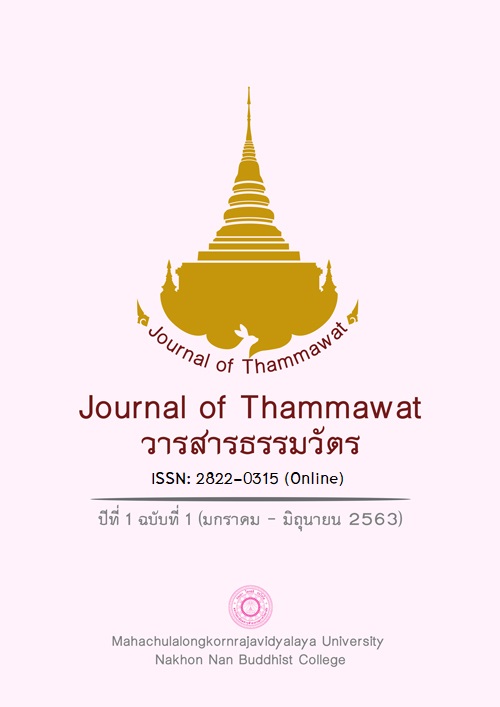The Community's Life Quality Promotion Based on the Sufficient Economy Philosophy
Main Article Content
Abstract
This research article aims to find guidelines for promoting and improving the life quality of people in the communities of Nan provinces following the Sufficiency Economy Philosophy, to study the problems in their living in the view of the Sufficiency Economy
Philosophy, and to create the knowledge how to improve their life quality based on the Sufficiency Economy Philosophy. This is the mixed research collecting data in both the quantity and quality research methods. The representative samples are 120 persons from the community leaders, the officers of the local administration organizations, the people in communities, the academic officers, the representatives of religious institutes, the merchants in communities, and the officers of the health promotion hospital of Namkien Sub-district. The research instruments are questionnaires, interviews, observations participatory, and focused group interviews. The research found that the way to improve people’s life quality conformed to the Sufficiency Economy Philosophy in 3 aspects: Economy, Society, and Environment. Using the principle of philosophy is the factor of success. They started by educating the people about the philosophy principle, then applying the principles with the working process of the community committees, encouraging the people’s participation in the process of developing the communities to be the economic sufficiency model, promoting
the human resources, promoting the good governance concept in the process of work management, and sustainably developing the people careers. The community’s problems based on the philosophy view is that the people have debts and the youth’s participation in resource management is reduced. Therefore, the research recommended that we should build the philosophy acceptance of the communities by creating an understanding of it overall, and then should transfer the local philosophers’ knowledge from one generation to another generation, should use new techniques in the knowledge management process together with building the community immunity by utilizing the principles of the philosophy.
Article Details

This work is licensed under a Creative Commons Attribution-NonCommercial-NoDerivatives 4.0 International License.
References
กระทรวงศึกษาธิการ. (2552). แนวทางการนิเทศเศรษฐกิจพอเพียงสู่สถานศึกษา. กรุงเทพฯ: สำนักงานปลัดกระทรวงศึกษาธิการ.
นราทิพย์ พุ่มทรัพย์. (2550). โครงการวิจัยและพัฒนากระบวนการปลูกฝังคุณธรรม จริยธรรมโดยอาศัยแนวทางพระบรมราโชวาทเรื่องคุณธรรม 4 ประการเป็นพื้นฐานในการเรียนรู้สู่วิถี เศรษฐกิจพอเพียง.
ศูนย์ส่งเสริมและพัฒนาพลังแผ่นดินเชิงคุณธรรมสำนักงานบริหารและพัฒนาองค์ความรู้ (องค์การมหาชน) : มหาวิทยาลัยมหิดล.
พระธรรมปิฎก (ป.อ. ปยุตฺโต). (2543). การพัฒนาที่ยังยืน. (พิมพ์ครั้งที่ 5). กรุงเทพฯ: สหธรรมิก.
พัชราภรณ์ ลิมปิอังคนันต์. (2552). การประยุกต์พระราชดำริเศรษฐกิจพอเพียงกับวิสาหกิจชุมชน: กรณีศึกษากลุ่มตีเหล็กบ้านร่องฟองอำเภอเมืองจังหวัดแพร่. (รายงานการวิจัย). มหาวิทยาลัยแม่โจ้– แพร่ เฉลิมพระเกียรติ.
วิเชียร วิทยอุดม และคณะ. (2552). ทัศนะของนักศึกษาต่อการนำปรัชญาเศรษฐกิจพอเพียงไปสู่การแก้ปัญหาความฟุ่มเฟือย: กรณีศึกษานักศึกษามหาวิทยาลัยเทคโนโลยีราชมงคลธัญบุรี คณะบริหารธุรกิจ. (รายงานการวิจัย). มหาวิทยาลัยเทคโนโลยีราชมงคลธัญบุรี.
สัมพันธ์ เตชะอธิกและคณะ. (2537). ศักยภาพและเครือข่ายผู้นำท้องถิ่น. พิมพ์ครั้งที่ 2. กรุงเทพฯ: เจริญวิทย์การพิมพ์


